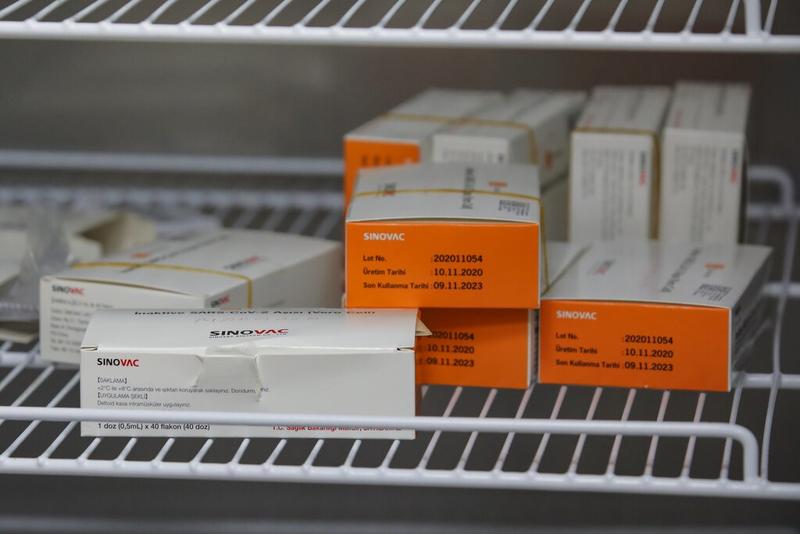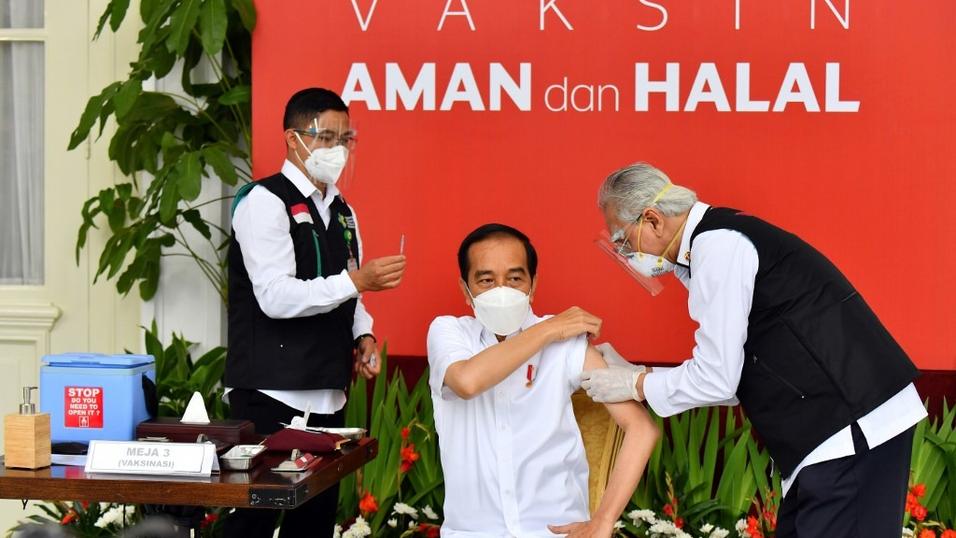 Boxes of doses of the CoronaVac vaccine, made by China's Sinovac Biotech Ltd, are seen inside a refrigerator during vaccinations of health workers at the Marmara University Pendik Education and Research Hospital in Istanbul, Turkey, Jan 14, 2021. (EMRAH GUREL / AP)
Boxes of doses of the CoronaVac vaccine, made by China's Sinovac Biotech Ltd, are seen inside a refrigerator during vaccinations of health workers at the Marmara University Pendik Education and Research Hospital in Istanbul, Turkey, Jan 14, 2021. (EMRAH GUREL / AP)
After helping other Asian nations battle COVID-19, China is offering hope in a region looking to its supply of vaccines to turn the tide against the pandemic, especially in developing countries.
With countries across the world racing to roll out vaccination programs, Chinese vaccines will play an important role in helping developing nations in Asia to secure enough doses for their people, analysts said.
Chinese supply "will be the one that fills the gap" in COVID-19 vaccine distribution, said Henry Chan, visiting senior research fellow at the Cambodian Institute for Cooperation and Peace, a think tank in Phnom Penh.
He was referring to concerns expressed by some observers that less-developed countries may not gain the same level of access to vaccines as developed ones.
China has pledged that it will share its vaccines with the world, including the members of the Association of Southeast Asian Nations, or ASEAN.
For authorities in developing countries, China's vaccines present a cheaper option and the protection afforded by the current efficacy rates is good enough, said Henry Chan, visiting senior research fellow at the Cambodian Institute for Cooperation and Peace
Across Asia, the response to the pandemic has been better than in North America and Europe. Even in India, the worst-hit Asian country, the recorded number of deaths from COVID-19 was 151,727 by Wednesday, according to a tally kept by Johns Hopkins University.
For the eastern rim of Asia, heavily populated Indonesia is the worst-affected nation, with more than 828,000 confirmed cases and 24,000 deaths.
At the same time in North America, the death toll of the United States has eclipsed 380,000, according to Johns Hopkins University.
Analysts attribute the relatively good record on coronavirus control in East and Southeast Asia to the presence of strong and trustworthy governments. Disciplined residents have largely supported social distancing efforts.
For authorities in developing countries, China's vaccines present a cheaper option and the protection afforded by the current efficacy rates is good enough, Chan said.
Chan said Chinese vaccines had been tested in some of the worst-affected countries and on people in high-risk groups.
He said the fact that China has vaccinated many of its citizens at home, and those going abroad, indicates the effectiveness and safety of its vaccines.
ALSO READ: What you need to know about China's COVID-19 vaccine
China pharmaceutical company Sinopharm said its COVID-19 vaccine has an efficacy of 79.34 percent. Sinovac Biotech's CoronaVac showed 91.25 percent efficacy in clinical trials in Turkey, Xinhua News Agency said.
The minimum level required by the WHO for a placebo-controlled efficacy trial is 50 percent.
On Jan 8, WHO Director-General Tedros Adhanom Ghebreyesus reiterated the need for the equitable distribution of the COVID-19 vaccines among rich and poor countries.
"At present, 42 countries are rolling out safe and effective COVID-19 vaccines," Tedros said. "Thirty-six of these are high-income countries and six are middle-income. So there's a clear problem that low and most middle-income countries are not receiving the vaccine yet."
Chinese drugmakers-including Sinopharm, Sinovac and CanSino Biologics-will supply nearly 400 million COVID-19 vaccine doses to countries in Latin America, the Middle East and Asia, according to data compiled by British analytics firm Airfinity and the Duke Global Health Innovation Center in the US.
Indonesia's Food and Drug Monitoring Agency gave the go-ahead for Sinovac's vaccine, agency official Penny Lukito told an online news conference from Bandung, West Java, on Monday.
READ MORE: China, Indonesia for cooperation on vaccine, economic projects
Indonesia began COVID-19 vaccinations on Wednesday. As many as 3 million doses of the Sinovac vaccine have been delivered to the archipelago, in addition to raw materials for 15 million doses that are to be produced in Indonesia.
Indonesian President Joko Widodo on Wednesday received the first of these shots.
 This photo taken on Jan 13, 2021 by Indonesia's Presidential Palace shows Indonesian President Joko Widodo, center, receiving the country's first COVID-19 vaccine jab at the Presidential Palace in Jakarta. (PHOTO / AFP)
This photo taken on Jan 13, 2021 by Indonesia's Presidential Palace shows Indonesian President Joko Widodo, center, receiving the country's first COVID-19 vaccine jab at the Presidential Palace in Jakarta. (PHOTO / AFP)
Bambang Heriyanto, corporate secretary of Indonesian state-owned vaccine manufacturer Bio Farma, spoke highly of the cooperation between Sinovac and the company.
Bio Farma has been tasked with producing COVID-19 vaccines in Indonesia, using technology shared by Sinovac, according to Xinhua. The partnership carried out clinical trials across the country.
China's commitment to making the vaccine a global public good will help the world to curb the pandemic, Heriyanto said, adding that countries should work together to end the pandemic.
READ MORE: China to help developing countries get access to vaccines
Aaron Jed Rabena, a research fellow at the Asia-Pacific Pathways to Progress, a foreign policy think tank in Manila, said China has helped countries in Southeast Asia cope with the coronavirus.
China's commitment to making the vaccine a global public good will help the world to curb the pandemic, Bambang Heriyanto, corporate secretary of Indonesian state-owned vaccine manufacturer Bio Farma said
Besides donating medical supplies, China sent an anti-pandemic medical expert team to the Philippines in April. The team was among the first three to be sent by China to ASEAN countries. In Laos, a Chinaaided COVID-19 nucleic acid test laboratory was inaugurated in November.
Timely aid
According to a white paper issued by China's State Council Information Office, China sent 29 teams of medical experts to 27 countries in the first five months of 2020. Aside from the Philippines, other nations included Cambodia, Laos, Malaysia, Myanmar and Pakistan.
Local governments, enterprises, civil organizations and individuals from China have donated medical supplies to more than 150 countries and regions as well as international organizations, Chinese Vice-Foreign Minister Ma Zhaoxu said in June. Anti-epidemic materials were exported from China to over 200 countries and regions.
"I have talked to some officials in the Philippines and Malaysia who are familiar with the Chinese delegations. They are quite grateful" for the assistance provided by China, said Chan.
The Philippines has secured 25 million doses of the Sinovac vaccine, with the first batch of 50,000 doses to be delivered by February, according to Xinhua.
"The Philippines just as with many other Southeast Asian countries want to start the vaccinations as soon as possible so as to quickly bring things back to normalcy. So vaccines from China are well-appreciated in this regard," Rabena said.
 Francisco Duque (left), health secretary of the Philippines, meets Chinese medical experts in Manila. (PHOTO / XINHUA)
Francisco Duque (left), health secretary of the Philippines, meets Chinese medical experts in Manila. (PHOTO / XINHUA)
China's vaccine cooperation goes far wider.
Michael Felfernig, medical director of the Abu Dhabi-based healthcare services provider RPMVPS Group, said the United Arab Emirates government is encouraging people to take the vaccine developed by Sinopharm, with the protective jabs a must for frontline healthcare staff.
Felfernig, who was inoculated in September, has been administering the Chinese jabs to his staff through his group's vaccination program. He said he experienced no side effects and that tests showed he has gained immunity.
The UAE became the first country to offer Chinese-developed COVID-19 vaccines to all citizens and residents for free, on Dec 23, according to media reports. The move came after the country approved the use of the Sinopharm vaccine in early December. The trials in UAE shows the Chinese vaccine provides 86 percent efficacy against COVID-19 infection.
"There are reports that the UAE is planning to manufacture the Chinese vaccine in the UAE," said Felfernig.
Scientific collaborations are necessary to gain quickly representative valid data which are informative about the efficiency and tolerance of different populations.
Michael Felfernig, Medical director of RPMVPS Group
In the Middle East, Bahrain approved emergency use of Sinopharm's vaccine in December after the nation earlier approved one from Pfizer and its German partner BioNTech.
In Turkey, Health Minister Fahrettin Koca on Wednesday received the Sinovac vaccine along with Turkey's advisory science council members on the eve of a nationwide vaccination drive.
They received the first shots on live television shortly after the vaccine was granted emergency authorization for use in Turkey.
The country has signed up for 50 million doses of Sinovac's CoronaVac. Twenty million of them are due to arrive by the end of the month.
In Ukraine, the country expects to start vaccination in the first half of 2021 with help from Sinovac, according to Lekhim Group, the country's leading pharmaceutical company.
Lekhim signed an agreement on Monday with Sinovac on the purchase of 5 million doses of CoronaVac, becoming the exclusive supplier of the vaccine in the country. It will receive the vaccine after it is registered for use in the country.
In South America, Peru will pay US$26 million for an initial batch of 1 million doses of the Sinopharm vaccine, part of a broader agreement with the Chinese company to supply 38 million doses, Economy Minister Waldo Mendoza said on Tuesday.
Chan said China has demonstrated its strength in biotechnology during the pandemic.
READ MORE: Indonesia vaccination drive seen as a turning point in virus fight
While the COVID-19 situation is relatively stable in China, there have been some new variants of the virus circulating globally, creating fresh risks in the fight against the virus.
"Scientific collaborations are necessary to gain quickly representative valid data which are informative about the efficiency and tolerance of different populations," said Felfernig.
Felfernig, who hopes Sinopharm will release more data about its vaccine in the future, said it is necessary that the COVID-19 jabs are affordable to all.
"This pandemic is affecting us all and we need to help each other," he said.
Jan Yumul in Hong Kong, Leonardus Jegho in Jakarta and agencies contributed to this story.


